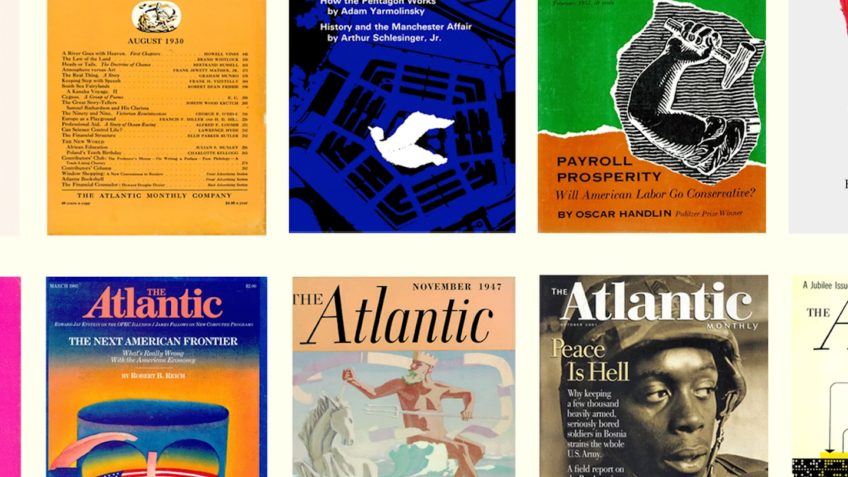
“The Atlantic” magazine received criticism after announcing a “product and content” agreement with the owner of ChatGPT
*For Sarah Scire
Just before the magazine The Atlantic announce a partnership “product and content” with OpenAI, the publication posted an article by the site’s CEO and founder The Information, Jessica Lessin, who argued that “media companies are making a big mistake with AI”.
According to Lessin, vehicle executives have submitted their businesses to the wills of Apple, Google and Meta in search of content distribution and technology money.
“News companies make deals to try to ride out the next digital wave. They make concessions to platforms that try to capture all the audience (and trust) that great journalism attracts, without ever having to do the complicated and expensive work of journalism itself. And it never, ever works as planned.”wrote the editor-in-chief of the technology website.
Shortly after the Atlantic Having announced the partnership, the magazine’s senior editor who oversees technology coverage, Damon Beres, called the deal “a devil’s bargain”. The newspaper’s journalists’ union said in a statement that cited Lessin’s article that members are “deeply concerned about the opaque agreement”.
In a video published on his LikedIn page, executive director of AtlanticNicholas Thompson, said the partnership with OpenAI will “emerge” journalism in products and that technology could eventually help readers discover stories in your app or produce “other cool things” for the magazine.
The publication is primarily a response to criticisms made by Lessin, Beres and others in the news industry.
Watch:
A Atlantic announced in April that it is profitable and has reached the 1 million subscriber mark. More than half of these subscribers are digital-only. Thompson said Facebook advertising played “an important role” in helping the channel acquire new subscribers.
“It was a bad idea for companies to do these video partnerships. On the other hand, Facebook advertising is an incredible tool for getting people to subscribe to serious newspapers. It is one of the main tools we use to make our subscription business at Atlantic – which has been the main factor that has led us to profitability – successful,” declared.
Thompson says editors “totally dependent” from Google search have “A big problem”. As the technology company experiments (and reverses, in some memorable cases) how it incorporates AI (artificial intelligence) into research, “it’s better to get as much traffic as possible from Google”.
Thompson, who interviewed OpenAI CEO Sam Altman at the UN “AI for Good” Summit on May 30, sees partnerships like OpenAI’s in this context.
“Google search will certainly decline in the coming years as it shifts to a more chat-based interface. This is a little scary. But that’s also one of the reasons I’m excited about partnering with OpenAI.”he stated.
According to the executive director, there is no way to know what Google search will be like in the future. However, “The closer you are to AI companies – and you are working with them, helping to work on the future of research and the stories within it – you will get more readers than if you are not”.
O Wall Street Journal reported that the Atlantic has around 100,000 users who read the magazine through Apple News. Thompson recognizes that Apple may one day “terminate the product or change the rules”. But in the meantime he says he believes that “if it’s good for the company now, work with them.”
The executive director warns, however, of the risks of dependence. “Don’t become totally dependent on it. Look for deals that are good for you with your eyes open to what could go wrong if company incentives change.”, he declared. For Thompson, it is necessary to understand that platforms are the operating system of the world in which we live.
Finally, the executive says he recognizes the importance of the media’s role in civic life and has dedicated his career to discovering sustainable business models for high-quality journalism. “I care a lot about trying to find the right models to work with these companies”these.
Sarah Scire is a deputy editor at Nieman Lab. Previously, she worked at Columbia University’s Tow Center for Digital Journalism, Farrar, Staus and Giroux, and The New York Times.
Text translated by Giullia Colombo. Read the original in English.
O Poder360 has a partnership with two divisions of Harvard’s Nieman Foundation: the Nieman Jorunalism Lab and Nieman Reports. The agreement consists of translating the texts of the Nieman Journalism Lab and Nieman Reports into Portuguese and publishing this material on Poder360. To access all translations already published, click here.
Source: https://www.poder360.com.br/nieman/parceria-com-openai-ira-aflorar-o-jornalismo-diz-diretor-de-revista/

